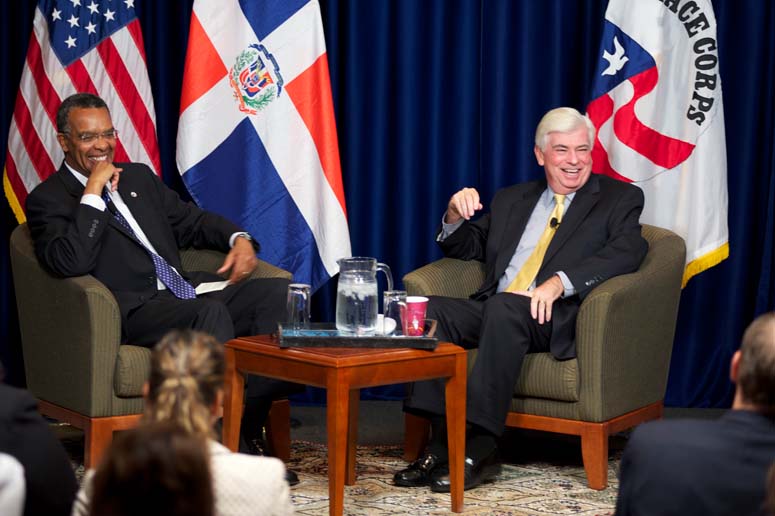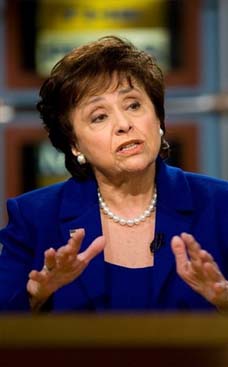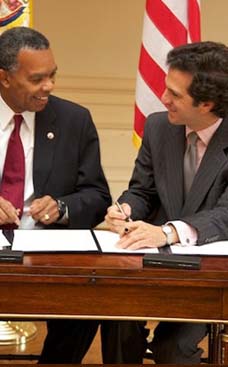
The Peace Corps has always neglected the third goal, allocating less than 1% of their resources to it. To solve this problem, both Senator Dodd's "Peace Corps for the 21st Century Bill" (below) that passed the Senate on October 16, 2002 with the support of the NPCA and the "Peace Corps Foundation" proposed by Peace Corps Director Ron Tschetter seek to promote the Third Goal of the Peace Corps by providing independent funding for RPCV activities associated with "bringing the world back home."
From Senator Dodd's Bill: "To carry out the purpose of this section, and subject to the availability of appropriations, the Chief Executive Officer of the Corporation for National and Community Service shall award grants on a competitive basis to private nonprofit corporations for the purpose of enabling returned Peace Corps volunteers to use their knowledge and expertise to develop and carry out the programs and projects described in subsection (a). (a) PURPOSE- The purpose of this section is to provide support for returned Peace Corps volunteers to develop and carry out programs and projects to promote the third purpose of the Peace Corps Act, as set forth in section 2(a) of that Act (22 U.S.C. 2501(a)), by promoting a better understanding of other peoples on the part of the American people."
From the proposal for a Peace Corp Foundation: "The Peace Corps Foundation would be a private charitable non-profit corporation. The goal of the Foundation is to increase public awareness within the United States of Peace Corps Volunteer experiences, and the diversity of the countries in which they serve. Groups such as the National Peace Corps Association and the numerous "friends of" groups comprised of Returned Volunteers could greatly benefit from Foundation resources. The Foundation would not be a federal agency; therefore it would not require any appropriated funds from Congress. Instead, funding for the Foundation would be sought from corporations, foundations, and private individuals; grants would be disseminated for specific programs under a governing board's direction. The activities of the Foundation will be planned in coordination and cooperation with the activities of the Peace Corps."
PCOL Comments: What is the difference between the two approaches to providing independent funding for third goal activities? Under Senator Dodd's bill, funding of $10 million per year to support third goal activities would be provided by the US government and would be administered by the Chief Executive Officer of the Corporation for National and Community Service. Under the "Peace Corps Foundation" proposed by Peace Corps Director Ron Tschetter, funding for the Foundation would be sought from corporations, foundations, and private individuals at no expense to the US government and the foundation would be administered by RPCVs. Both are good approaches but in the present congressional budgetary climate the creation of a "Peace Corps Foundation" seems much more likely to garner bi-partisan support. Presidential support of the "Peace Corps Foundation" could be Barack Obama's gift to the Peace Corps on the occasion of it's 50th birthday.
Senator Dodd's "Peace Corps Charter for the 21st Century Act" Proposed Independent Funding for Third Goal Activities
Peace Corps Charter for the 21st Century Act (Engrossed as Agreed to or Passed by Senate)
S 2667 ES
107th CONGRESS
2d Session
S. 2667
AN ACT
To amend the Peace Corps Act to promote global acceptance of the principles of international peace and nonviolent coexistence among peoples of diverse cultures and systems of government, and for other purposes.
Be it enacted by the Senate and House of Representatives of the United States of America in Congress assembled,
SECTION 1. SHORT TITLE.
This Act may be cited as the `Peace Corps Charter for the 21st Century Act'.
SEC. 2. FINDINGS.
Congress makes the following findings:
(1) The Peace Corps was established in 1961 to promote world peace and friendship through the service of American volunteers abroad.
(2) The three goals codified in the Peace Corps Act which have guided the Peace Corps and its volunteers over the years, can work in concert to promote global acceptance of the principles of international peace and nonviolent coexistence among peoples of diverse cultures and systems of government.
(3) The Peace Corps has operated in 135 countries with 165,000 Peace Corps volunteers since its establishment.
(4) The Peace Corps has sought to fulfill three goals, as follows: to help people in developing nations meet basic needs, to promote understanding of America's values and ideals abroad, and to promote an understanding of other peoples by Americans.
(5) After more than 40 years of operation, the Peace Corps remains the world's premier international service organization dedicated to promoting grassroots development.
(6) The Peace Corps remains committed to sending well trained and well supported Peace Corps volunteers overseas to promote peace, friendship, and international understanding.
(7) The Peace Corps is an independent agency, and therefore no Peace Corps personnel or volunteers should be used to accomplish any other goal than the goals established by the Peace Corps Act.
(8) The Crisis Corps has been an effective tool in harnessing the skills and talents for returned Peace Corps volunteers and should be expanded to utilize to the maximum extent the talent pool of returned Peace Corps volunteers.
(9) The Peace Corps is currently operating with an annual budget of $275,000,000 in 70 countries with 7,000 Peace Corps volunteers.
(10) There is deep misunderstanding and misinformation about American values and ideals in many parts of the world, particularly those with substantial Muslim populations, and a greater Peace Corps presence in such places could foster greater understanding and tolerance.
(11) Congress has declared that the Peace Corps should be expanded to sponsor a minimum of 10,000 Peace Corps volunteers.
(12) President George W. Bush has called for the doubling of the number of Peace Corps volunteers in service.
(13) Any expansion of the Peace Corps shall not jeopardize the quality of the Peace Corps volunteer experience, and therefore can only be accomplished by an appropriate increase in field and headquarters support staff.
(14) In order to ensure that proposed expansion of the Peace Corps preserves the integrity of the program and the security of volunteers, the integrated Planning and Budget System supported by the Office of Planning and Policy Analysis should continue its focus on strategic planning.
(15) A streamlined, bipartisan National Peace Corps Advisory Council composed of distinguished returned Peace Corps volunteers and other individuals, with diverse backgrounds and expertise, can be a source of ideas and suggestions that may be useful to the Director of the Peace Corps as he discharges his duties and responsibilities as head of the agency.
SEC. 3. DEFINITIONS.
In this Act:
(1) APPROPRIATE CONGRESSIONAL COMMITTEES- The term `appropriate congressional committees' means the Committee on Foreign Relations of the Senate and the Committee on International Relations of the House of Representatives.
(2) DIRECTOR- The term `Director' means the Director of the Peace Corps.
(3) PEACE CORPS VOLUNTEER- The term `Peace Corps volunteer' means a volunteer or a volunteer leader under the Peace Corps Act.
(4) RETURNED PEACE CORPS VOLUNTEER- The term `returned Peace Corps volunteer' means a person who has been certified by the Director as having served satisfactorily as a Peace Corps volunteer.
SEC. 4. RESTATEMENT OF INDEPENDENCE OF THE PEACE CORPS.
(a) IN GENERAL- Section 2A of the Peace Corps Act (22 U.S.C. 2501-1) is amended by adding at the end the following new sentence: `As an independent agency, all recruiting of volunteers shall be undertaken primarily by the Peace Corps.'.
(b) DETAILS AND ASSIGNMENTS- Section 5(g) of the Peace Corps Act (22 U.S.C. 2504(g)) is amended by inserting after `Provided, That' the following: `such detail or assignment does not contradict the standing of Peace Corps volunteers as being independent: Provided further, That'.
SEC. 5. REPORTS AND CONSULTATIONS.
(a) ANNUAL REPORTS; CONSULTATIONS ON NEW INITIATIVES- Section 11 of the Peace Corps Act (22 U.S.C. 2510) is amended by striking the section heading and the text of section 11 and inserting the following:
`SEC. 11. ANNUAL REPORTS; CONSULTATIONS ON NEW INITIATIVES.
`(a) ANNUAL REPORTS- The Director shall transmit to Congress, at least once in each fiscal year, a report on operations under this Act. Each report shall contain information--
`(1) describing efforts undertaken to improve coordination of activities of the Peace Corps with activities of international voluntary service organizations, such as the United Nations volunteer program, and of host country voluntary service organizations, including--
`(A) a description of the purpose and scope of any development project which the Peace Corps undertook during the preceding fiscal year as a joint venture with any such international or host country voluntary service organizations; and
`(B) recommendations for improving coordination of development projects between the Peace Corps and any such international or host country voluntary service organizations;
`(2) describing--
`(A) any major new initiatives that the Peace Corps has under review for the upcoming fiscal year, and any major initiatives that were undertaken in the previous fiscal year that were not included in prior reports to the Congress;
`(B) the rationale for undertaking such new initiatives;
`(C) an estimate of the cost of such initiatives; and
`(D) the impact on the safety of volunteers;
`(3) describing in detail the Peace Corp's plans for doubling the number of volunteers from 2002 levels, including a five-year budget plan for reaching that goal; and
`(4) describing standard security procedures for any country in which the Peace Corps operates programs or is considering doing so, as well as any special security procedures contemplated because of changed circumstances in specific countries, and assessing whether security conditions would be enhanced--
`(A) by colocating volunteers with international or local nongovernmental organizations; or
`(B) with the placement of multiple volunteers in one location.
`(b) CONSULTATIONS ON NEW INITIATIVES- The Director of the Peace Corps should consult with the appropriate congressional committees with respect to any major new initiatives not previously discussed in the latest annual report submitted to Congress under subsection (a) or in budget presentations. Wherever possible, such consultations should take place prior to the initiation of such initiatives, but in any event as soon as practicable thereafter.'.
(b) ONE TIME REPORT ON STUDENT LOAN FORGIVENESS PROGRAMS- Not later than 30 days after the date of enactment of this Act, the Director shall submit to the appropriate congressional committees a report--
(1) describing the student loan forgiveness programs currently available to Peace Corps volunteers upon completion of their service; and
(2) comparing such programs with other Government-sponsored student loan forgiveness programs; and
(3) recommending any additional student loan forgiveness programs which could attract more applicants from more low and middle income applicants facing high student loan obligations.
SEC. 6. SPECIAL VOLUNTEER RECRUITMENT AND PLACEMENT FOR COUNTRIES WHOSE GOVERNMENTS ARE SEEKING TO FOSTER GREATER UNDERSTANDING BETWEEN THEIR CITIZENS AND THE UNITED STATES.
(a) REPORT- Not later than 60 days after the date of enactment of this Act, the Director shall submit a report to the appropriate congressional committees describing the initiatives that the Peace Corps intends to pursue with eligible countries where the presence of Peace Corps volunteers would facilitate a greater understanding that there exists a universe of commonly shared human values and aspirations. Such report shall include--
(1) a description of the recruitment strategies to be employed by the Peace Corps to recruit and train volunteers with the appropriate language skills and interest in serving in such countries; and
(2) a list of the countries that the Director has determined should be priorities for special recruitment and placement of Peace Corps volunteers.
(b) USE OF RETURNED PEACE CORPS VOLUNTEERS- Notwithstanding any other provision of law, the Director is authorized and strongly urged to utilize the services of returned Peace Corps volunteers having language and cultural expertise, including those returned Peace Corps volunteers who may have served previously in countries with substantial Muslim populations, in order to open or reopen Peace Corps programs in such countries.
SEC. 7. GLOBAL INFECTIOUS DISEASES INITIATIVE.
(a) IN GENERAL- The Director, in cooperation with international public health experts such as the Centers for Disease Control and Prevention, the National Institutes of Health, the World Health Organization, the Pan American Health Organization, and local public health officials shall develop a program of training for all Peace Corps volunteers in the areas of education, prevention, and treatment of infectious diseases in order to ensure that all Peace Corps volunteers make a contribution to the global campaign against such diseases.
(b) DEFINITIONS- In this section:
(1) AIDS- The term `AIDS' means the acquired immune deficiency syndrome.
(2) HIV- The term `HIV' means the human immunodeficiency virus, the pathogen that causes AIDS.
(3) HIV/AIDS- The term `HIV/AIDS' means, with respect to an individual, an individual who is infected with HIV or living with AIDS.
(4) INFECTIOUS DISEASES- The term `infectious diseases' means HIV/AIDS, tuberculosis, and malaria.
SEC. 8. PEACE CORPS ADVISORY COUNCIL.
Section 12 of the Peace Corps Act (22 U.S.C. 2511; relating to the Peace Corps National Advisory Council) is amended--
(1) by amending subsection (b)(2)(D) to read as follows:
`(D) make recommendations for utilizing the expertise of returned Peace Corps volunteers in fulfilling the goals of the Peace Corps.';
(2) in subsection (c)--
(A) in paragraph (2)(A)--
(i) in the first sentence, by striking `fifteen' and inserting `seven'; and
(ii) by striking the second sentence and inserting the following: `Four of the members shall be former Peace Corps volunteers, at least one of whom shall have been a former staff member abroad or in the Washington headquarters, and not more than four shall be members of the same political party.';
(B) by amending subparagraph (D) to read as follows:
`(D) The members of the Council shall be appointed to 2-year terms.';
(C) by striking subparagraphs (B) and (H); and
(D) by redesignating subparagraphs (C), (D), (E), (F), (G), and (I) as subparagraphs (B), (C), (D), (E), (F), and (G), respectively;
(3) by amending subsection (g) to read as follows:
`(g) CHAIR- The President shall designate one of the voting members of the Council as Chair, who shall serve in that capacity for a period not to exceed two years.';
(4) by amending subsection (h) to read as follows:
`(h) MEETINGS- The Council shall hold a regular meeting during each calendar quarter at a date and time to be determined by the Chair of the Council.'; and
(5) by amending subsection (i) to read as follows:
`(i) REPORT- Not later than July 30, 2003, and annually thereafter, the Council shall submit a report to the President and the Director of the Peace Corps describing how the Council has carried out its functions under subsection (b)(2).'.
SEC. 9. READJUSTMENT ALLOWANCES.
The Peace Corps Act is amended--
(1) in section 5(c) (22 U.S.C. 2504(c)), by striking `$125' and inserting `$275'; and
(2) in section 6(1) (22 U.S.C. 2505(1)), by striking `$125' and inserting `$275'.
SEC. 10. PROGRAMS AND PROJECTS OF RETURNED PEACE CORPS VOLUNTEERS TO PROMOTE THE GOALS OF THE PEACE CORPS.
(a) PURPOSE- The purpose of this section is to provide support for returned Peace Corps volunteers to develop and carry out programs and projects to promote the third purpose of the Peace Corps Act, as set forth in section 2(a) of that Act (22 U.S.C. 2501(a)), by promoting a better understanding of other peoples on the part of the American people.
(b) GRANTS TO CERTAIN NONPROFIT CORPORATIONS-
(1) GRANT AUTHORITY- To carry out the purpose of this section, and subject to the availability of appropriations, the Chief Executive Officer of the Corporation for National and Community Service (referred to in this section as the `Corporation') shall award grants on a competitive basis to private nonprofit corporations for the purpose of enabling returned Peace Corps volunteers to use their knowledge and expertise to develop and carry out the programs and projects described in subsection (a).
(2) PROGRAMS AND PROJECTS- Such programs and projects may include--
(A) educational programs designed to enrich the knowledge and interest of elementary school and secondary school students in the geography and cultures of other countries where the volunteers have served;
(B) projects that involve partnerships with local libraries to enhance community knowledge about other peoples and countries; and
(C) audio-visual projects that utilize materials collected by the volunteers during their service that would be of educational value to communities.
(3) ELIGIBILITY FOR GRANTS- To be eligible to compete for grants under this section, a nonprofit corporation shall have a board of directors composed of returned Peace Corps volunteers with a background in community service, education, or health. The nonprofit corporation shall meet all appropriate Corporation management requirements, as determined by the Corporation.
(c) GRANT REQUIREMENTS- Such grants shall be made pursuant to a grant agreement between the Corporation and the nonprofit corporation that requires that--
(1) the grant funds will only be used to support programs and projects described in subsection (a) pursuant to proposals submitted by returned Peace Corps volunteers (either individually or cooperatively with other returned volunteers);
(2) the nonprofit corporation will give consideration to funding individual programs or projects by returned Peace Corps volunteers, in amounts of not more than $100,000, under this section;
(3) not more than 20 percent of the grant funds made available to the nonprofit corporation will be used for the salaries, overhead, or other administrative expenses of the nonprofit corporation;
(4) the nonprofit corporation will not receive grant funds for programs or projects under this section for a third or subsequent year unless the nonprofit corporation makes available, to carry out the programs or projects during that year, non-Federal contributions--
(A) in an amount not less than $2 for every $3 of Federal funds provided through the grant; and
(B) provided directly or through donations from private entities, in cash or in kind, fairly evaluated, including plant, equipment, or services; and
(5) the nonprofit corporation shall manage, monitor, and submit reports to the Corporation on each program or project for which the nonprofit corporation receives a grant under this section.
(d) STATUS OF THE FUND- Nothing in this section shall be construed to make any nonprofit corporation supported under this section an agency or establishment of the Federal Government or to make the members of the board of directors or any officer or employee of such nonprofit corporation an officer or employee of the United States.
(e) FACTORS IN AWARDING GRANTS- In determining the number of nonprofit corporations to receive grants under this section for any fiscal year, the Corporation--
(1) shall take into consideration the need to minimize overhead costs that direct resources from the funding of programs and projects; and
(2) shall seek to ensure a broad geographical distribution of grants for programs and projects under this section.
(f) CONGRESSIONAL OVERSIGHT- Grant recipients under this section shall be subject to the appropriate oversight procedures of Congress.
(g) FUNDING-
(1) IN GENERAL- There is authorized to be appropriated to carry out this section $10,000,000. Such sum shall be in addition to funds made available to the Corporation under Federal law other than this section.
(2) AVAILABILITY- Amounts appropriated pursuant to paragraph (1) are authorized to remain available until expended.
SEC. 11. AUTHORIZATION OF APPROPRIATIONS.
Section 3(b)(1) of the Peace Corps Act (22 U.S.C. 2502(b)(1)) is amended--
(1) by striking `2002, and' and inserting `2002,'; and
(2) by inserting before the period the following: `, $465,000,000 for fiscal year 2004, $500,000,000 for fiscal year 2005, $560,000,000 for fiscal year 2006, and $560,000,000 for fiscal year 2007'.
Passed the Senate October 16, 2002.
Attest:
Secretary.
107th CONGRESS
2d Session
S. 2667
AN ACT
To amend the Peace Corps Act to promote global acceptance of the principles of international peace and nonviolent coexistence among peoples of diverse cultures and systems of government, and for other purposes.
THIS SEARCH THIS DOCUMENT GO TO
Next Hit Forward New Bills Search
Prev Hit Back HomePage
Hit List Best Sections Help
Doc Contents













